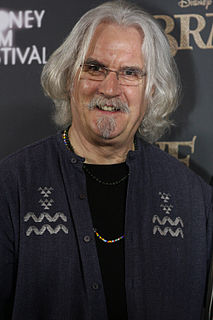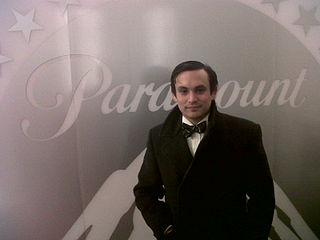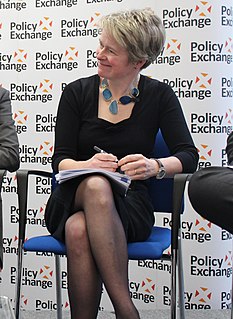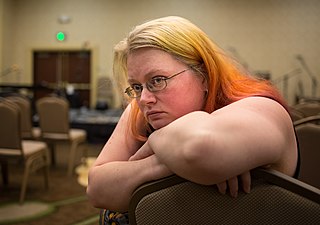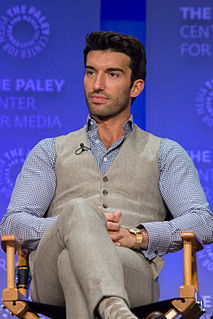A Quote by Gloria Steinem
I don't remember being thought of as good-looking until I became a feminist. It's more of a comment on people's expectations than of what a feminist would look like. They assumed that if you could get a man, you wouldn't want anything else - what else could you possibly want? So that feminists who were talking about such things as equal pay must be doing so because they were unable to get a husband to support them, and therefore they must be ugl - this was the sort of train of thought. So because I looked different from the stereotype, then people would comment.
Quote Topics
About
Anything
Anything Else
Assumed
Became
Because
Being
Comment
Could
Different
Doing
Else
Equal
Equal Pay
Expectations
Feminist
Feminists
Get
Good
Good-Looking
Husband
Like
Look
Looked
Looking
Man
More
Must
Pay
People
Possibly
Remember
Sort
Stereotype
Support
Talking
Than
Them
Then
Therefore
Things
Thought
Train
Train Of Thought
Unable
Until
Want
Were
Would
Related Quotes
One of the things I really like about doing work online, and the thing I like about the work I'm doing now, is that I get to meet feminists all the time and I get to read new feminists every day on the blogosphere. And it's really that kind of diversity of thought that informs me more than anything else these days. It's just kind of learning something new all the time. And I kind of love that there's not really a feminist canon; or maybe there is, but it's being changed, that it's a constantly moving canon in the feminist blogosphere. I love that.
It's always been important to me to be very upfront with people about the fact that I do identify as a feminist because it's an opportunity to expose people to and educated them about the movement. Young women don't identify as feminist is because they don't know any feminists and don't have a comprehensive understanding of what it is, I gave them example and an opportunity to ask about it. And once they saw that I wasn't the embodiment of the negative feminist stereotype - that I was a normal teen girl just like them - I think they became more open to learning about what feminism really is.
If this understanding of the good news of Jesus prevailed among Christians, the belief that Jesus’s message is about how to get somewhere else, you could possibly end up with a world in which millions of people were starving, thirsty, and poor; the earth was being exploited and polluted; disease and despair were everywhere; and Christians weren’t known for doing much about it. If it got bad enough, you might even have people rejecting Jesus because of how his followers lived. That would be tragic.
When I was an orphan, I was the richest kid at the orphanage because everyone else was complaining about not having anything. But when I discovered that you could get two cents for a Coca-Cola bottle, I would follow people around who were drinking it and ask them if they were almost through with it.
Quite frankly, I talk about the fact that I'm a feminist as often as I can, and every time I do, it gets huge reaction, and media reacts, and the Twitterverse explodes and things like that, because here I am saying I'm a feminist. I will keep saying that until there is no more reaction to that when I say it, because that's where we want to get to.
He believed that he must, that he could and would recover the good things, the happy things, the easy tranquil things of life. He had made mistakes, but he could overlook these. He had been a fool, but that could be forgiven. The time wasted--must be relinquished. What else could one do about it? Things were too complex, but they might be reduced to simplicity again. Recovery was possible.
Remember how pissed you got when we had to do all that reading about the Rising back in sixth grade? I thought you were going to get us both expelled. You said the only way things could've gotten as bad as they did was if people were willing to take the first easy answer they could find and cling to it, rather than doing anything as complicated as actually thinking.
There were two things that became apparent, pretty quickly into the process. One was that the muscles didn't take as much reconditioning as I thought they would. It was more like voice acting than I thought it would be. You're using your whole body and there are things that are different, but when you are doing a character, even in the booth, nobody is watching but my face will do different things when I do different characters.
It was a sort of organic thing. I never went, 'I must be an actress.' I thought, 'I think I could do this. I think I could be good at this.' I would just get sort of hungry when I read something I thought I can do well, whether it was in books or in scripts or if I saw a certain movie. It sort of happened quite naturally.
I grew up in a world where authority was female. I never thought to call myself a feminist because of branding. I had this skewed idea of feminist: I thought it meant being a woman who hates men. When I read Chimamanda Ngozi Adichie's We Should All Be Feminists, I was like, "Oh, this is what my mom taught me. This is simple. I don't understand why everybody is not this."
These principles laid down as in variable rules: that one must pay a card sharper, but need not pay a tailor; that one must never tell a lie to a man, but one may to a woman; that one must never cheat any one, but one may a husband; that one must never pardon an insult, but one may give one and so on. These principles were possibly not reasonable and not good, but they were of unfailing certainty, and so long as he adhered to them, Vronsky felt that his heart was at peace and he could hold his head up.



